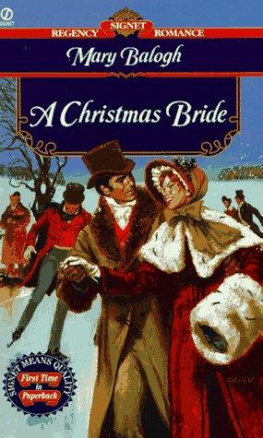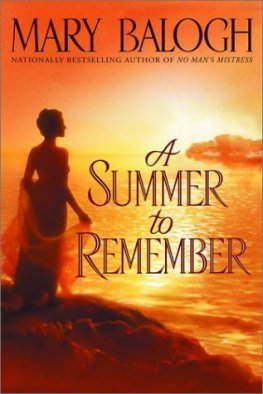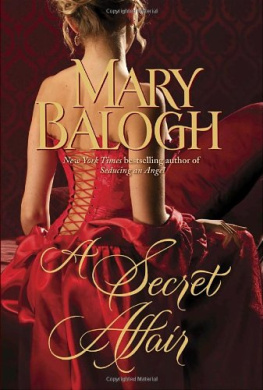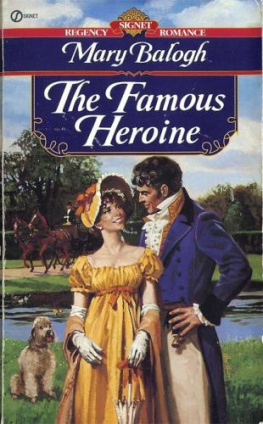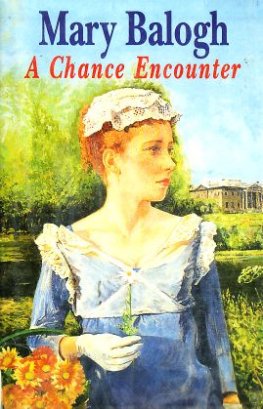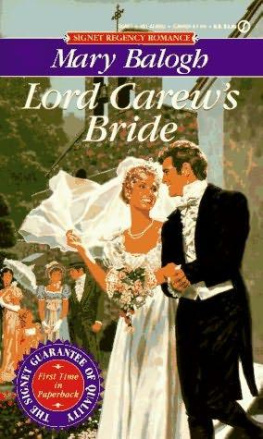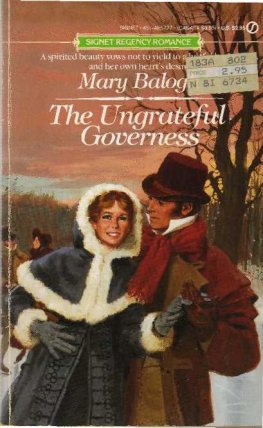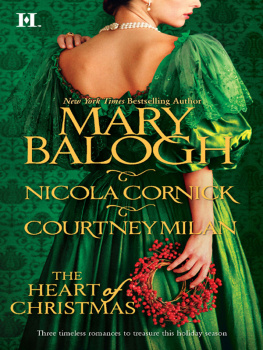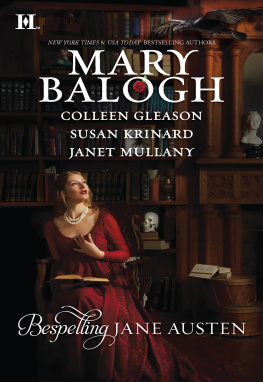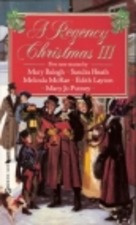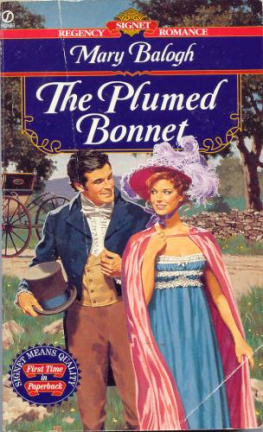Mary Balogh - A Christmas Bride
Here you can read online Mary Balogh - A Christmas Bride full text of the book (entire story) in english for free. Download pdf and epub, get meaning, cover and reviews about this ebook. year: 1997, publisher: Signet, genre: Prose. Description of the work, (preface) as well as reviews are available. Best literature library LitArk.com created for fans of good reading and offers a wide selection of genres:
Romance novel
Science fiction
Adventure
Detective
Science
History
Home and family
Prose
Art
Politics
Computer
Non-fiction
Religion
Business
Children
Humor
Choose a favorite category and find really read worthwhile books. Enjoy immersion in the world of imagination, feel the emotions of the characters or learn something new for yourself, make an fascinating discovery.
- Book:A Christmas Bride
- Author:
- Publisher:Signet
- Genre:
- Year:1997
- Rating:4 / 5
- Favourites:Add to favourites
- Your mark:
- 80
- 1
- 2
- 3
- 4
- 5
A Christmas Bride: summary, description and annotation
We offer to read an annotation, description, summary or preface (depends on what the author of the book "A Christmas Bride" wrote himself). If you haven't found the necessary information about the book — write in the comments, we will try to find it.
A Christmas Bride — read online for free the complete book (whole text) full work
Below is the text of the book, divided by pages. System saving the place of the last page read, allows you to conveniently read the book "A Christmas Bride" online for free, without having to search again every time where you left off. Put a bookmark, and you can go to the page where you finished reading at any time.
Font size:
Interval:
Bookmark:
Chapter 1
M r. Edgar Downes had decided to take a bride. Doubtless he should have made up his mind to do so long before he did, since he was six-and-thirty years old and had both a high respect for matrimony and a fondness for family life. But the truth was that he had procrastinated. He had felt caught between two worlds. He was not a gentleman. He was the son of a Bristol merchant who had grown enormously wealthy over the years and had eventually purchased and renovated a grand mansion and estate near Bristol and retired to live there like a gentleman. Edgar had been educated at the best schools, had become a respected and successful lawyer, and then had taken over his father's business.
He was hugely wealthy in his own right. He had received a gentleman's education. He spoke and dressed as a gentleman. He would inherit Mobley Abbey on his father's death. He was extremely eligible. But he was not a gentleman by birth, and in certain circles that fact made all the difference in the world.
He had thought about marrying someone of his own kind. At various points during his adulthood he had even singled out a few daughters or sisters of his middle-class acquaintances as possible wives. But he had never felt that he quite belonged in their world not when it came to something as personal and intimate as marriage. He would have been hard put to it to explain exactly why that was so. There were certain almost puritanical attitudes in the class, perhaps, or a certain vulgar preoccupation with money and possessions for their own sake. Though neither explanation quite accounted for his discomfort.
He had thought of marrying a lady. But there had been obvious arguments against that. And they all narrowed down to one simple fact he was not a gentleman. It was true that Cora, his sister and only sibling, had married a younger son of a duke seven years before and had become Lady Francis Kneller as a result. It was true too that Edgar got along remarkably well with his exceedingly elegant brother-in-law and with those of their aristocratic friends he had met. But though Cora's marriage appeared to be bowling along very nicely indeed and had produced four bouncing children, Lord Francis would not in the normal course of events have wed her. It was her disastrous tendency to play heroine without pausing for one hundredth part of a second to consider the wisdom of her actions that had forced him on more than one occasion to her rescue and to compromising circumstances at the same time. Finally, poor fellow, he had had no choice as a gentleman but to take on a leg shackle and Cora all at the same time.
Lord Francis Kneller and his friends the Earl of Thornhill, for example, or the Marquess of Carew or the Duke of Bridgwater might be quite prepared to treat Mr. Edgar Downes, Lady Francis's brother, as a friendly acquaintance. But would they be happy to watch him woo and wed their sisters or cousins if he so chose, and if there were any such females available? It was a question Edgar could not answer with any certainty since he had never posed it to any of the gentlemen concerned, but he could make an educated guess.
Some lesser gentleman with a daughter difficult to fire off in a more acceptable manner due to impoverishment or lack of beauty or a shrewish nature, perhaps might be very willing to ally her to a cit, to a lawyer-turned-merchant who also happened to be as wealthy as all but a few of the bluest-blooded lords in the land and with as much more wealth again to inherit on the death of his father. That lesser gentleman, however, would believe in his heart and all the genteel world would believe with him that he had stooped low indeed for the mere satisfaction of seeing his daughter wed.
But at the age of six-and-thirty Edgar Downes had decided to take a bride. A bride of good birth. A lady, no less. And he was going to do it soon. By Christmastime he would either be betrothed or have fixed his choice firmly and confidently enough that he would invite the woman and her family to Mobley Abbey for the holiday and a celebration of the betrothal. It was a promise he had made his father, and he always kept his promises.
The elder Mr. Downes celebrated his sixtieth birthday at the beginning of September. And though it would be difficult to find a healthier, more robust, more mentally agile man of his age anywhere in the kingdom, he had chosen on that occasion to remember his mortality and to declare himself an old man. An old man with a dying wish. Cora had shrieked when he had put it thus, doubtless imagining all sorts of hidden and deadly ailments, and Lord Francis had pursed his lips. Edgar had rocked back on his chair. The dying wish was to see his son wed. Perhaps he would even be spared long enough to see a grandson in the nursery not that he had any objection in the world to granddaughters, but in the nature of things a man longed for at least one grandson.
And since Mr. Downes had achieved almost every goal that any man could possibly set himself in the course of his lifetime including a lamentably short but blissfully happy marriage, the birth and survival of the best son and daughter a man ever had, not to mention a challenging and successful career and the acquisition of the abbey he had only one more thing to wish for, apart from the marriage of his son, of course, and that was the birth of a grandson. He could wish that his son would marry well, that he would finally ally the Downes name to one of undoubted gentility.
"You are a gentleman, my son," he said, nodding his head in Edgar's direction, his eyes beaming with pride and affection. "Your dear mother was a lady in every sense that mattered to me. But for my son I want a lady by birth. You have deserved such a wife."
Edgar felt embarrassed, especially since these words had been spoken in the presence of Lord Francis Kneller. He also felt suspiciously damp-eyed. His father meant more to him than almost anyone else in this world.
"And it is high time you married, Edgar," Cora said. "It is all very well for the children to have an uncle who spoils them dreadfully every time he crosses paths with them, but cousins would be of more practical value to them. And an aunt."
Lord Francis chuckled. "You must confess, Edgar," he said, "you have had a good run of it. You are six-and-thirty and only now is your family laying siege to your single state."
"That is quite unfair, Francis," Cora said. "You know that every time Edgar has come to Sidley since our marriage I have thrown the most eligible young ladies in his way. You know that I have tried my very best."
Lord Francis chuckled again. "You are as successful as a matchmaker, my love," he said, "as you are at your swimming lessons."
"Well," she said crossly, "whoever says that the human person my human person anyway is not heavier than water and will not sink like a stone when laid out on top of it must have windmills in his head and that is all I have to say."
"For which mercy may the Lord be praised," Edgar said, provoking outright laughter from his brother-in-law and a glare followed by a rueful chuckle from his sister.
But his father was not to be diverted from what he had clearly planned as the mission of his sixtieth birthday. Edgar was to marry and to marry a lady. A duke's daughter could not be too good for his son, he remarked.
"What a pity it is that Francis's sisters are married," Cora commented. "Is it not, Francis?"
"Quite so, my love," he agreed.
But any lady of breeding would do nicely, Mr. Downes continued after the interruption. Provided Edgar could like and respect her and feel an affection for her. That, it seemed, was of greater importance than almost anything else.
"She does not have to be a lady of fortune, my boy," Mr. Downes said. "She can come to you penniless, provided she has the birth and breeding and can love you."
A penniless lady of
Font size:
Interval:
Bookmark:
Similar books «A Christmas Bride»
Look at similar books to A Christmas Bride. We have selected literature similar in name and meaning in the hope of providing readers with more options to find new, interesting, not yet read works.
Discussion, reviews of the book A Christmas Bride and just readers' own opinions. Leave your comments, write what you think about the work, its meaning or the main characters. Specify what exactly you liked and what you didn't like, and why you think so.

